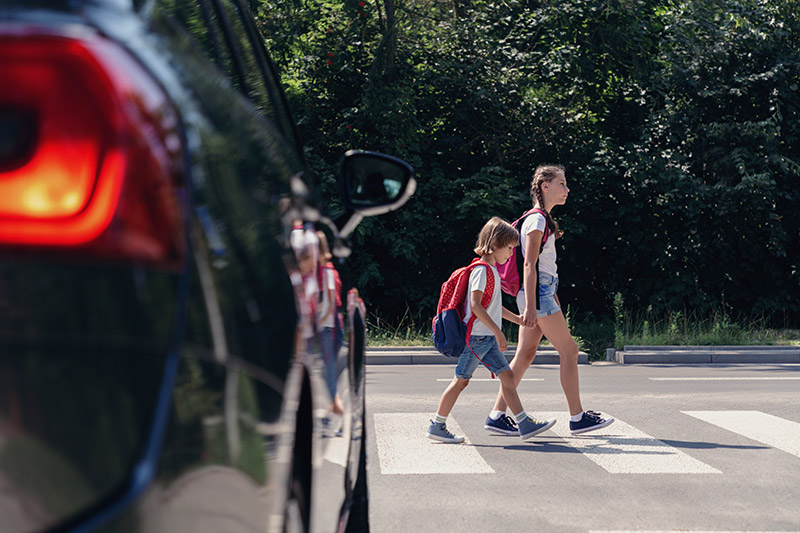*Information on this page was originally developed by a team that created a website for families focusing on 'raising deaf kids' (See About Us). Content may have been edited or updated.
Your child may need some help staying safe.
Read this page for tips on keeping your child safe.
Plan ahead
Have a communication plan ready in case there's an emergency:
- Make sure your child knows who to contact and how in case of an emergency.
- Talk about how to contact an interpreter if your child needs one.
- Make sure your child carries a card with emergency numbers with him at all times.
- Make sure your child's school, coaches, and childcare providers know how to reach you.
- Prepare an emergency kit with water, flashlights, hearing aid batteries, and other things your child may need.
- Make sure your home is safe inside and outside.
- Practice the plan with your family.
- Teach your child to be
independent.
Fire safety
- Use fire alarms in your home that flash lights and are sound activated.
Check your alarms once a month or more to make sure they're working.
Plan escape routes ahead of time. Talk about what to do in case of a fire.
Think of ways to communicate to your child that there's a fire.
Water safety
- If your child signs, find an interpreter for your child's swimming lessons.
- Make sure there's a way your child can communicate with the lifeguard on duty.
- Talk to your child about how hearing aids and cochlear implants (CIs) need to be protected while the child swims (carefully placed in a case unless the CIs are waterproof).
Be street smart
Kids think that if they can see a car, the driver can see them. They also have trouble understanding how fast a car is going. Your child may not hear the sounds of cars coming towards her. Teach your child to be street smart:
 Stop at the curb and look in all directions before you cross the street.
Stop at the curb and look in all directions before you cross the street.- Cross at corners using traffic signals and crosswalks if you live in a city.
- Never walk into the street from behind a car, tree, or large object.
- Never run into a street without stopping, even for a ball or your dog!
- Walk or ride a bike facing traffic, so you can see cars coming towards you.
- Watch for cars that are turning or backing up.
- Pay attention to others and watch when they move out of the way.
- Carry a flashlight when it's dark.
- Wear bright clothing.
- Use reflective lights on your bike.
Sign safety
- Some parents of kids who are DHH choose to have a sign put up on their street that says: "Caution Deaf Child" or "Deaf Children at Play." If drivers see this sign, they may slow down or be more alert.
- Other parents choose not to use these signs because they want to protect their child's privacy.
- For more information on visit:
https://handsandvoices.org/articles/education/advocacy/14-1_streetsign.htm
Stay away from strangers
- Never leave your young child alone anywhere - not in a car, home, or public place.
- Make sure your child learns his or her address very early and can tell people how to get in touch with you in an emergency.
- Teach your child how to make an emergency call on a cell phone and say “I need help" or how to contact help through a video relay service.
- Make sure your child knows to scream and run from anyone who is trying to grab or hurt her.
- Practice with a friend your child does not know. Ask your friend to grab your child or try to get her to go somewhere with him. Show your child how to respond.
- Tell your child to always let you know right away if a stranger asks her for help, gives her candy or gifts, or scares her in any way.
- Teach your child to use mirrors and windows on buildings to watch her reflection and see who's behind her.
If
you
think
your
child
is
missing:
- Try to stay calm.
- Ask your neighbors, family, and friends if anyone knows where your child is or if they've seen her.
- Check in places where your child may not be able to hear you well.
- Call your city's emergency hotline and file a missing persons' report
|
Internet safety
- Never give out personal information, like your child's address, picture, password, cell phone number.
- Tell your child to let you know right away if she gets any strange messages, emails, or sees something she doesn't like.
- Be on the lookout for emails that have different addresses than the ones she usually sends mail to.
- Make sure she knows never to promise to meet with someone she met online.
For more information on child safety, visit:
https://www.healthychildren.org/English/safety-prevention/Pages/default.aspx
https://www.boystownpediatrics.org/knowledge-center#k=safety